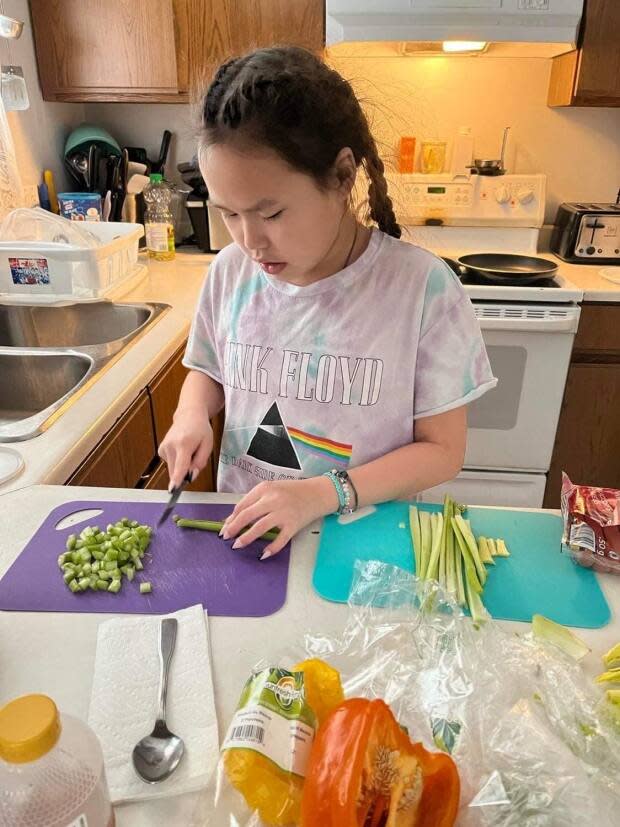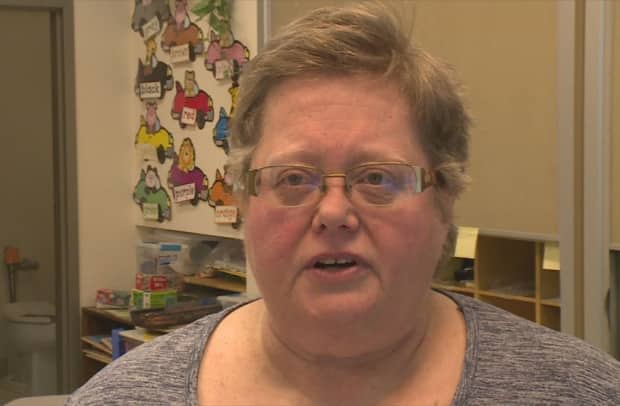'A sense of warmth': N.W.T. school uses cooking to stay connected to its students and parents

Students in much of the Northwest Territories are learning from home this week, and that means a return of some unusual homework for families at Chief Sunrise Education Centre on the K'atl'odeeche First Nation: cooking.
Deborah Reid, the school's principal, says staff have been delivering boxes of ingredients and healthy recipes each week to their students' homes ever since the school had a closure in October.
"Most, if not all, of us find working in the kitchen pretty accessible, and our kids just love to cook and love to be in the kitchen," Reid said of the more than 50 students at the school.
"Food brings people together. There's a sense of warmth when that happens in the family and the community, when there's food."
For students and parents both, the homework is simple: the students cook, and the parents snap some photos. Then, the school celebrates their students' creations online by sharing those photos on Facebook.
Aside from keeping families engaged, the exercise strengthens students' core skills: math, reading, nutrition, even art. It's a type of learning that can be hard to replicate inside classrooms.

Reid said the school has gone beyond giving ingredients to kids. It has some funding sources to offer healthy food — smoothies, fruit salads and more — to students that would normally access breakfasts and snacks in school.
"It's been a real success," she said.
Exposing a divide
Reid said the exercise has been an important part of how the school stays connected with its families and builds trust with parents. Remote learning creates divides, she said, between those who can do it and those who can't — and COVID-19 has discouraged some parents from staying involved with schools.
"We struggled for years in the north to get people to accept schools and have trust in schools, because of the residential school legacy," Reid explained. "So this comes along, and all of a sudden schools are a scary place to be in because they could get sick."
Merril Dean, a child psychologist and member of the N.W.T. Education Hall of Fame, said the pandemic has brought that division to light: families that can afford internet versus those who can't, for instance.
She said when schools initially shut down at the start of the COVID-19 pandemic, there was a push to get food out to families.
"Food programs have been a major, major issue," she said. "Schools are providing morning breakfast, lunches if the school is open over lunch, and snacks during the day. So suddenly, food insecurity in the home for these children became a much bigger issue than it had been."

Beyond food, Reid said schools also often provide support for families and children in crisis or who are in potentially dangerous situations.
She hopes to see some of those issues examined once the pandemic ends.
She said student engagement is another issue that's coming to light — and she expects that to manifest through attendance figures.
"Talking to teachers who are doing online learning, they're talking to me about seeing large numbers of absences [online]," she said.
"The students aren't engaged in the classes, per se, that are being offered online. I think if they're actually keeping accurate records of attendance, we'll see that it's a bit lower."
A different learning experience
Starr Elanik, a Grade 12 student at Moose Kerr School in Aklavik, told CBC remote learning isn't as challenging as classroom learning — but that's not all bad, since teachers can't help her out in-person.
"I want to do challenging work in school because there's going to be teachers there to help me step-by-step," she explained.
She's enjoying spending time with her family at home, but she expects that once she returns to the classroom, she may worry about how that lack of challenge has affected her.
Dean said that's part of the struggle with remote learning. Not only does it require high levels of motivation and self-direction, but it may not be as easy for parents to help students in higher grades with their homework.
"If individualized learning packages were the best way to go, would we actually even have these institutions called schools?"
That's where grace comes in, Dean said — and it's important for parents, teachers and students of all ages.
"Grace is just that idea of recognizing that we can't be perfect and that we can't necessarily do it all."


